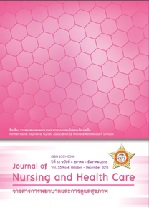ปัจจัยที่มีอิทธิพลต่อคุณภาพชีวิตผู้ป่วยมะเร็งเต้านมที่ได้รับเคมีบำบัด: แบบจำลองเชิงสาเหตุ Factors Influencing Quality of Life of Breast Cancer Patients Receiving Chemotherapy: A Causal Model
คำสำคัญ:
คุณภาพชีวิต แบบจำลองเชิงสาเหตุ ผู้ป่วยมะเร็งเต้านม quality of life, Causal model, breast cancerบทคัดย่อ
การวิจัยครั้งนี้มีวัตถุประสงคเ์ พื่อทดสอบความสัมพันธเ์ ชิงสาเหตุของปจั จัยที่มีอิทธิพลตอ่ คุณภาพชีวิตผูป้ ว่ ย
มะเร็งเต้านมที่ได้รับเคมีบำบัด กลุ่มตัวอย่างเป็นผู้ป่วยมะเร็งเต้านมที่มารับเคมีบัดตั้งแต่ครั้งที่ 3 เป็นต้นไปจำนวน
123 คน ที่ได้มาโดยการสุ่มอย่างง่ายจากผู้ป่วยมะเร็งเต้านมที่มารับเคมีบัด ที่โรงพยาบาลมหาสารคาม และ
โรงพยาบาลมะเร็งอุดรธานี เครื่องมือที่ใช้ในการวิจัย ประกอบด้วย 1) แบบสอบถามอาการข้างเคียงจากการรักษา
2) การสนับสนุนทางสังคม 3) ความเครียดจากการเป็นมะเร็งเต้านม 4) การเผชิญความเครียดแบบมุ่งแก้ปัญหา
5) การเผชิญความเครียดแบบมุง่ จัดการกับอารมณ ์ และ 6) แบบสอบถามคุณภาพชีวิตของผูป้ ว่ ยมะเร็งเตา้ นม สถิติ
ที่ใช้ในการวิเคราะห์ปัจจัยที่มีอิทธิพลต่อคุณภาพชีวิตของผู้ป่วยมะเร็งเต้านมโดยใช้การวิเคราะห์เส้นทางด้วย
โปรแกรมคอมพิวเตอร์สำเร็จรูป AMOS ผลการศึกษาพบว่า แบบจำลองความสัมพันธ์เชิงสาเหตุปัจจัยที่มีอิทธิพลต่อคุณภาพชีวิตผู้ป่วยมะเร็งเต้านมที่ได้รับเคมีบำบัดมีความสอดคล้องกับข้อมูลเชิงประจักษ์ (x2 = 4.42, df = 5, p value = .49, x2 / df = .88, GFI= .98, AGF I = .95, CFI = 1.00, NFI = .98, RMSEA = .00) คุณภาพชีวิตของผู้ป่วยมะเร็งเต้านมที่ได้รับเคมีบำบัดได้รับอิทธิพลโดยรวมสูงสุดจากความรุนแรงของอาการข้างเคียงของเคมีบำบัด (β = -.24) รองลงมาคือ การเผชิญความเครียดแบบมุ่งแก้ปัญหา (β = .24) การสนับสนุนทางสังคม (β = .11) และความเครียดจากการเป็นมะเร็งเต้านม (β = .07)โดยปัจจัยทั้งหมดสามารถอธิบายคุณภาพชีวิตผู้ป่วยมะเร็งเต้านมที่ได้รับเคมีบำบัดได้รอ้ ยละ 8.4 ผลการวิจัยเสนอแนะวา่ ในชว่ งที่ผูป้ ว่ ยมะเร็งเตา้ นมไดรั้บเคมีบำบัด พยาบาลควรสง่ เสริมใหผู้ป้ ว่ ยมีการเผชิญความเครียดแบบมุ่งแก้ปัญหาและหาวิธีการ เพื่อช่วยลดความรุนแรงของอาการข้างเคียงของเคมีบำบัด
The objective of this research was to test a causal model of factors influencing quality of life among breast cancer patients receiving chemotherapy. A random sample of 123 breast cancer patients receiving chemotherapy for the third time or more at Mahasarakham Hospital and Udonthani Cancer Hospital was recruited in the study. Research instruments included 1) the Modified Memorial Symptom Assessment Scale, 2) Social Support Questionnaire, 3) Breast Cancer Concern Questionnaire, 4) Problem-Focused and Emotional-Focused Coping Scale, and 5) the Functional Breast Cancer Therapy. Data were analyzed
by using path analysis which was conducted in the of Analysis of Moment Structures (AMOS) program.The results showed the modified model of factors influencing quality of life of breast cancer patients receiving chemotherapy was consistent with the empirical data (x2= 4.42, df = 5, p value = .49, x2/ df = .88, GFI = .98, AGFI = .95, CFI = 1.00, NFI = .98, RMSEA = .00) The model showed that quality of life f breast cancer patients receiving chemotherapy was mostly influenced by the severity of side effects of chemotherapy (β = -0.24) followed by problem-focus coping (β = .24), social support (β = 0.11), and
breast cancer concern (β = 0.07). The variables in the model accounted for 8.40% of the variance of quality of life among breast cancer patients. Findings of the study suggest that nursing interventions to enhance using problem-focus coping and to efforts to reduce severity of chemotherapy side effects among breast cancer patients are important.



